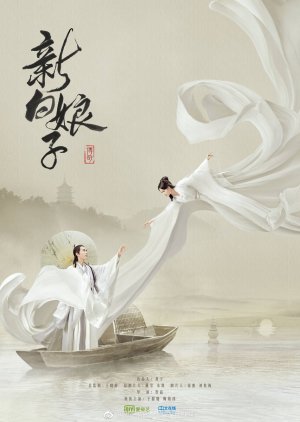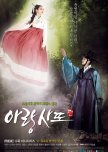A beautiful remake of a classic tale with beautifully sung OST by the FL
I had been putting off watching this drama due to its poor review. However, I'm glad that I finally watch it, and completed it.I had watched the New Legend of White Snake (1992) by Angie Chiu and Cecilia Yip in my younger days, but do not remember much except for the main plot. I enjoyed watching this 2019 version, as I get to understand more about the main message.
Despite some poor comments about the acting, I think the acting was decent, most of the close-up scenes did show corresponding emotions from both Alan Yu & JJY. I didn't like most of the scenes in the Heaven and under the sea, as they feel really fake. The casting for the immortals doesn't seem to fit, except for Lu Dongbin, Guan Yin & the Goddess in charge of the rebirth. I like the scene where Suzhen went to take the Bancheng lotus, that scene struck a chord in me! Ruyi was really annoying, but that only shows that the actress (Yu Lang) did well portraying her. Tim Pei did well as Fa Hai, too. And of course, Xiao Qing was the most adorable character in this version.
For those who complained about the lack of chemistry between the leads, they ought to understand that this is a classic tale, the original was in opera form. It was set in an era where husband and wife show their affection in a very subtle way. I like the way the ML defends the FL in front of his sister. That was considered very outstanding for that era, where filial piety is the basis of individual moral conduct and social harmony.
It is interesting that they involved the actresses from the 1992 version in this 2019 version. Even though Cecilia Yip fit into her role as Xu Xian's mother (due to her ageless beauty), I think the actress who portrayed Xiao Qing's mom looks a bit aged to be her mom. The worst part was they cast Angie Chiu's son as Xu Xian's son, he really looks too old for the role (he is older than Alan Yu), and doesn't seem to fit with the image of the Star of Wisdom.
The ending seems a bit rush, Suzhen came out in the exact same dress, and look exactly the same as when she went in, which was probably around 20 odd years later. And yes, I agree with some of the comments that the two leads should at least embraced when they met again after such a long time.
And last but not least, I like the way JJY sang the OST, which to me is much better than the 1992 version, even though it is basically the same song.
Cet avis était-il utile?

First of all, I was quite interested because of the poster I Netflix. I was satisfied with it and I was curious about the storyline.
Second, is that I don't know. I am a blabbermouth. LoL
My Aunt is very picky about what she watches especially if its from the upper part of Southeast Asia. At first, I tried watching it out of curiosity but eventually got bored, At that time I was watching with my aunt for like 2 episodes. Then the next day she urges me to watch the next episode of it so I say that she likes it and she enjoys watching it, eventually I enjoy it too. One time because I was very lazy to go down and watch it on our tv she actually watches an episode without me. Swas very mad about the character of Yu Lang and it was funny for me to see murmuring ow hateful Yu Lang's character Jin Ruyi is.
Cet avis était-il utile?

Cette critique peut contenir des spoilers
Debo decir que esta versión de "La Leyenda de la Serpiente Blanca" no fue lo que esperaba, esta adaptación ha dejado mucho que desear, sin mencionar que algunos capítulos se sienten monótonos, como si fueran solo relleno. Lo que ayudó mucho a no volverse un drama tan tedioso, es la esencia nostálgica y serena que se pudo apreciar en todo momento , esto hizo que fuera un drama bonito; al igual que las escenas divertidas de la Serpiente Verde (fue lo mejor del drama). El romance de la Serpiente Verde tuvo más química que el romance principal, no pude sentir en ningún momento la química entre la Serpiente Blanca y Xu Xuan, a pesar de que trataron de representar el amor verdadero y eterno con estos dos personajes, se enfocaron más en lo visual que en el sentimiento, creo yo que, la causa es la plana actuación de Yu Menglong y un tanto las circunstancias.
También quiero mencionar una de las tantas incongruencias en la trama, Por Ejemplo.
★Se supone que cuando un demonio siente amor por un humano, el veneno ocasionado por el amor del demonio hace que progresivamente el Humano se deteriore hasta ocasionarle la muerte. ¿Como explican que la Serpiente Verde, al momento de despedirse del amor de su amado, le haya dado la pócima del olvido a él y no se lo haya tomado ella? ¿No se supone que la serpiente verde debió haberse tomado la pócima del olvido para radicar el veneno?, pero esa no es la verdadera incógnita, la verdadera pregunta se encuentra en el hecho de que el amado de la Serpiente Verde se encuentre con vida y buena salud, yo que recuerde por un largo tiempo la Serpiente Verde seguía amándolo, respecto a cómo funciona el veneno del amor, se supone que su amado ya debería estar muerto.
No es un mal drama si lo vemos del punto de vista espiritual. Creo yo que tiene varias enseñanzas y una de las enseñanzas que nos presentan es: "Un demonio puede tener un corazón bondadoso y un humano puede tener un corazón malvado" lo que significa que no tenemos que guiarnos por los prejuicios, ya que muchas veces pueden ser incorrectos.
Cet avis était-il utile?
Emocionante e Cativante
Drama emocionante e cativante! A fotografia e cenários são surpreendentes! Gostei muito de assistir, apesar de chorar muitas vezes! E voltaria a assistir novamente!O que me cativou na história foi o amor e cumplicidade entre os protagonistas Bai Su Zhen e Xu Xuan. Os dois sempre apoiando um ao outro. Mesmo que a Jin Ru Yi tente separá-los o amor e harmonia entre o casal é forte!
Outro ponto é que Bai Su Zhen e Xu Xuan sempre pensam no próximo e em ajudar da melhor forma a todos que necessitam. Realizando atendimentos médicos com preços acessíveis e até mesmo gratuitamente.
Os personagens apresentam muitas características bem humanas, mesmo buscando atender aos outros, em alguns momentos da trama apresentam momentos de raiva, fazendo-os agir e tomar atitudes extremas.
É uma série que traz muitas reflexões sobre cumplicidade, confiança, amor não egoísta, pré julgamentos, sentimentos de posse e obsessão.
Cet avis était-il utile?
Thus far, Legend of White Snake is a series of moral parables or tales. At the centre, are Xu Xuan and Bai Su Zhen - one a human, the other a snake spirit/demon. Both kind, generous beings committed to living an upright and moral life.
Various characters try to corrupt them or bring them down but they stay steadfast. Indeed, so steadfast that there is not much interest or plot. Everything resolves in the same predictable manner. The actors - due to the script, direction, or their own talents show very little range.
Xiaoqing provides some comedic life and interest as a good hearted prankster. The colour palate of gray/white/green provides some lovely moments, and a contrast to many other Chinese dramas. But it does get a bit monotone after awhile.
I don't need my dramas to be full of operatic drama, alpha self-destructive heroes and vicious or saintly women. I truly was looking forward to a different model. But this is just too one note.
Cet avis était-il utile?
The subsequent tantric ‘revolution’ aimed on the contrary to exploit mutual sexual pleasure as springboard to self-transcendence that instead enhanced sensual enjoyment, but free of delusory worldly entanglements. The instinctual inheritance of our animal physiology was visualized to be rooted at the base of the spinal column as a coiled dormant snake that upon awakening would rise to unite with cerebral self-awareness. This kiss of the serpent resulted not only in the (inner) ‘death’ of the (limited worldly) self: the fiery expansion of consciousness (agni) consumes the entire body to be drenched with the rejuvenating elixir (soma) of immortality. Already encapsulated in the Vedic Agni-Soma complex, such esoteric knowledge was diversely propagated in later Hindu mythology, e.g., through a forest conflagration extinguished by torrential rains, narrated in an erotically charged context.
The Legend of the White Snake reconfigures this trans-sectarian tantric vision into the ideological parameters of Chinese popular culture. Having performed austerities for a thousand years, Bai Suzhen is instructed by the Goddess of Mercy to live as a human to attain liberation . The virtuous snake falls deeply in love with and marries the mortal healer Xu Xian . But her unwitting husband’s vital force is sapped away by this ‘unnatural’ union with her demonic essence, culminating in his sudden death upon witnessing her reversion to reptilian form . The faithful wife then risks her life to steal the elixir of immortality from its heavenly guardians. All this while, puritanical monk Fahai is bent on exposing and capturing the snake with his magic staff and begging bowl. As Xian, with the Mind-Demon finally helpless within his pure body, is scorched alive amidst sacred chanting, Bai in this climax invokes the flood to extinguish the fires. Defeated in battle, the now pregnant demon is spared and, having served her purpose, banished beneath the basement of Lei Feng pagoda at West Lake in Hangzhou city .
Chinese ‘religion’ was already a fusion of two distinct ritual traditions: Confucianist ethics that underpinned the social order and Taoist esotericism that permeated popular culture. The introduction of Buddhist monasticism ran counter to their respective this-worldly orientation and quest for bodily rejuvenation. Indian tantricism, exemplified by this elevation of the serpent power, offered a fresh platform for harmonizing their rival claims. Taoist ‘immortality’ became grounded in self-transcendence, inner renunciation the precondition for full enjoyment of the world. The child-prodigy conceived through such consummate sexual union was believed to be born of and for enlightenment (bodhi-citta). Topping the imperial exams before returning to redeem his imprisoned demon mother , Bai’s ‘orphaned’ son is not a happy afterthought appended to an otherwise tragic tale of impossible love .
The Indian embodiment of such harmonious synthesis is the tantric sage Abhinavagupta (c. 950-1016 CE), believed to be the ‘offspring’ (yoginī-bhū) of such a felicitous union. The transgressive nature of such practice is underlined through the motif of theft, which is how Vedic god Indra acquired the Soma: hence the ‘unaccountable’ (stolen) treasures that Bai keeps conferring on Xian, for which the ‘innocent’ husband is even punished. Yet Abhinavagupta’s authoritative public writings on theater and the arts are imbued with the overriding intention to preserve and reinforce the Hindu socioreligious order (dharma).
The White Snake opera, which ends with the filial son redeeming his parents, begins by declaring: “They disclosed the immortal design […] With the Three Teachings accomplished, all hatred was gone.” Devout custodian of Buddhism, Confucianism and (Manchu) shamanism, the Qianlong Emperor was so impressed during his 1765 tour of South China that this supreme connoisseur brought its performance back to Beijing to celebrate in 1771 the 80th birthday of his beloved mother, the empress-dowager.
Touring Hangzhou’s Ling Yin temple (3 July 2016) during our first visit to China (Shanghai), we stopped to pay respect to the dedicated scholar-monks who had brought such spiritual wisdom from India . Youthful Chinese pilgrims kept asking Sunthar, the brown-skinned stranger, to join in selfies before these statues . Heading directly from there to Lei Feng pagoda, we came across key scenes from the legend carved into wood panels along its inside walls. As students of comparative religion and Hindu tantrism , we could immediately ‘recognize’ its hidden meaning. Having recently enjoyed ( on Netflix ) all 36 episodes of its most recent (web-) production, we feel privileged to share this bare outline of our decipherment.
Sunthar Visuvalingam. & Elizabeth Chalier, " White Snake - tantric sexuality in Chinese popular culture "
(Review published India Post, 25 Oct.. 2019; pp. 19 , 22 )
Cet avis était-il utile?

Cette critique peut contenir des spoilers
Better than expected
This style of show is not my norm. Started this as filler between on air shows. I got hooked. Beautiful to look at. The theme song and music are haunting, huge add to the depth and emotions of scenes. The last 6 episodes are powerful emotional storms. They drained me, sad to heart crushing. Don't freak, there is some tearful happy mixed in. The introduction and development of Bai and Qing will get you heavily vested in their stories. Ruyi is a pitiful image of desperation pursing a never to be love. She performs evil blinded by her one direction love. Her emotional pain and dispare are so real. Yu Lang mastered her roll as Ruyi. In the end I still had sympathy for her. Qing (Xioa Yan) beautiful and enduring radiance. Funny, angry, sad, mean, childish, vengeful, she delivered every scene worthy of award recognition. Bai (Ju Jing Yi) is entrancing. Her macro/micro expressions and body language perfect in character. My only dump would be Xu Xain. I just thought to flat and lacked personality or emotional expression. The acting, visuls, music, and directing all come together to make this series perfect for your currently watching list. Fantasy, romance, acton, heart breaks, abound in this wonderful adventure.Cet avis était-il utile?
However, after Bai Suzhen, the white snake, and Han Wen, the physician, get married they lose their sparkle and often look sick and helpless which shouldn't be because they married for love and were (apparently) very happy together. Qing, the green snake, saves the day! Although temperamental, she's basically kind and wants to do well, becomes very attached to Bai Suzhen and tries to protect her. She also brings much needed humor to the episodes. B.Z. is in a difficult position being a 'demon' and having to conceal it and fend off the jealous young competitor for the love of Han Wen, but does she have to look so miserable all the time? She has the upper hand, anyway, but both she and her husband seem to be exceedingly good and kind to the point that they become boring. It took me a long time to watch all the episodes because of this. I do hope the sequel is livelier.
Cet avis était-il utile?
IWantGoodQualityDramas
1 personnes ont trouvé cette critique utile
Cette critique peut contenir des spoilers
So-so.
If you are into story wherin leads have strong chemistry, this is for you! The male lead is very good in depicting love at first sight. I watched this because of him. I love Qing qing's character too. She adds color to the story. She is the second reason why I watched the show.For the white snake, I understand it's not Ju jing Yi's fault but her character is bland. Like ugh. For the plot.. the dragging of story mades it boring though honestly speaking, it is not too cliche. Like a not cliche story but not beneficial to the whole. Also qing qings lover just vanished to thin air after the sad ending. The ending is rushed.
Cet avis était-il utile?

The storyline was original, but had a lot of potential given the well designed graphics. Unfortunately, with a staggering length of 36 episodes and a lack of well choreographed chemistry between characters, it was difficult to watch all the way through. At certain points, I even lost track of the storyline as there were lots of underdeveloped plotlines and an exorbitant amount of needless scenarios.
I still think this series is worth giving it a watch if you're curious, but it just wasn't the right fit for me.
Cet avis était-il utile?
50FiftillidideeBrain
0 personnes ont trouvé cette critique utile
Legendary Bore °4.5° °too cold-blooded°
I was watching the show, Unrequited Love-7. The leading couple is teased by being compared to The Legend of White Snake. That made it an easy choice as to what to watch next. Let me make it easy for you: Don't bother. It isn't worth your time given the many better shows out there.I love Chinese fantasy. It may be the best in the world. So, I went into TLOWS expecting to love it, which carried me through half the show. I ignored irritation after boring irritation until I finally realized that TLOWS is really, really bad. (Still finished it - waste of time). TLOWS is a 2019 release that is rated a too generous 7.6 on MDL. It is 1 season consisting of 36 45-minute episodes. It’s plot slithers and meanders around without going in a clear linear direction. It's frequently pleasant and the characters are likable, but it's boring at the same time. It stays in the dust and never lifts to greater heights. I never once actually liked TLOWS, despite all the wanting to. I suppose we could say that it goes into snake-like Brumation. The primary couple is simply goodness in silk robes, but they're dull.
The logic is insulting at times. Xu's older sister is often a veritable moron in the way she looks at things. She doesn't seem to understand that Bai and Xu are married ~ Ruyi is not part of their relationship. Xu’s amnesia doesn't change that. Another example is when Bai believes her own presence is the problem. Qing points out that Ruyi is a schemer. Bai shouldn't let Xu stay around her. Bai lamely replies that Ruyi truly loves Xu and would never hurt him. On the contrary! Ruyi's actions not only caused the current mess, but she has done /nothing but/ endanger and HURT others! There's betrayals with too little justification - it all happens too easily and is often the opposite of what was previously established. At one point Xu is focused on Bai and what he thinks is a wrong strategy to deal with a demon oppressing the family. He calls in the monk to help… with BAI, but NOT the demon doing the oppressing? Ridiculous. It doesn't recover from that, slipping from average to below average. There's plenty more examples; they pile up. I started to actively hate it north of ep30, and by ep34 my fangs came out.
Lots of viewers enjoyed it, however. Maybe they hadn't seen Handsome Siblings-8.7 or Ancient Love Poetry-8.6 yet. Now /those/ are good fantasy shows. This show has groundwork for something spectacular but it never leaves the pit. The following is from the notes that I took when it still ‘had’ me.
Per Wiki, “The Legend of the White Snake is a Chinese legend centered around a romance between a man named Xu Xian and a female snake spirit named Bai Suzhen. It is counted as one of China's Four Great Folktales…”
Tim Pei (Miss Truth) is Fa Hai, a fighting monk. His Shifu has foreseen a bad omen: There's a dangerous thousand-year-old evil spirit in Lin'an. He gives Hai two magic weapons: A bowl to catch the demon and an elaborate pixie cane to identify sinister forces. Hai is strictly forbidden to act on anything without a sign from the cane. He wants to eliminate Qing, but the cane loves her. This monk is adorable. Don't get your hopes up. The monk has the potential to be the best romantic lead of the show, but monks are celibate.
Ju Jing Yi (In a Class of Her Own) plays snake spirit “Bai” Su Zhen. She's just cultivated into her human form after a millennia of effort. She is kind. She wouldn't dream of hurting people; she wants to be a Buddhist. Request denied: She must live as a human first. Humans have emotions, and Bai must learn how to overcome emotions. Off to earth she goes, where she gets to experience the most wonderful thing on earth. Love? NO! FOOD!
Early on she meets physician Xu. She knew the doctor's previous incarnation but finds the current version lacking. He notices her, she's beautiful afterall, but she's not impressed. She leaves, unimpressed. Yu Meng Long (Eternal Love-8.3) plays Dr. “Xu” Xuan (he's often called Hanwen). Bai encounters a darling young boy whose mother is very ill and offers to help. Guess who's already treating the woman? She clashes with the good doctor once again at the patient's house. Each thinks the other is a scammer. As attraction builds, though, he ain't gotta chance. One day when she doesn't want him to leave, she conjures a rainstorm. Still, a more willing victim may not be found. In the end, the romance is cold blooded and nearly emotionless, sadly.
In the meantime, Ruyi is also out to entrap Dr. Xu - into marriage. Yu Lang (The Sword and the Brocade-8.6) plays shyster Jin ‘Ruyi’. Selfish Ruyi is the source of most of the conflict in the show. Li Lin (In a Class of Her Own) plays Xu's brother i/l and the police constable. He's one of my favorite characters. Prince Mu looks alittle like Chachi (Scott Baio) from Happy Days.
We haven't even gotten to our 4th lead yet. Xiao Yan (Love Is Sweet) is Xiao ‘Qing’, a naughty snake deity. Qing's exactly what the good monk is looking for ~ to kill. She, by far, is the best thing about the show. The actress is adorable. Asian culture interchangeably translates the words deity and demon, but it's not exactly the Western/Christian concept of demons. In Chinese fantasy, demons can be good, and many are. In TLOWS and many other stories, cultivating power and growing strong is excessively difficult and painstaking. For demons, the same result can be achieved by devouring humans, and who doesn't love a shortcut? Many succumb to the temptation. Demons get a bad name from that. Early on, Qing has clashes with Bai, but that only sparks Qing's interest. Abandoned by her mother long ago, she's lonely. She was cultivating into a man, and so far, she's managed to become 80% woman. When the quest starts (she opts to follow Bai) her cultivation stops, so they are two Sassy-lassies traveling together. Wait. Cultivating into a man is more difficult, and takes more time, than cultivating into a woman? The opposite should be what's true. Given their reproductive organs, women's bodies seem more complicated than men's anatomy. Even the creation story shows man as a warm-up and woman as the final prototype. Jusss sayin…
Most of our protags also clash with a fox demon, Lady Nexin, early in the show. She soon has our 4 protags plotting against eachother. The centipede demon - the really bad monster - is also on the prowl. While the leads are, intermittently, looking squint and wide-eyed at eachother, things are increasingly dangerous. Children have already started disappearing from Lin'an. Soon demons and other bad guys are impersonating our protags casting greater confusion.
“Predjudices are not formed in a day.” “We differentiate between demons and humans with our hearts.” The primary theme is racism. Though genetically human, Ruyi is the actual demon in TLoWS. The monk is the one who struggles with the issue and must ultimately fight the monster within himself before it takes control and changes /him/ into a demon. When Qing helps Monk Hai fight the centipede, Hai is forced to re-examine his presuppositions. “Common people seek benefit, but wise people seek the core…” once Bai passes on her essence to Xu to heal him, she's no longer fully a demon, and he's no longer completely human. As a literal thinker, this is a conundrum for Hai, and he spends a good deal of the show working it out. That's one of the funniest (and most tragic) things about racism. The very word is a lie. What is race? There is only the human race, with its many ethnicities. Ethnic groups are just large, very old families. We all hail from the area that is now the Middle East and Ethiopia. Scientists and theologians agree - we came from one woman. Race and racism are just pride-based lies that we have all decided to believe. It is hard enough to find a decent human being. Limiting yourself to one shade of skin makes the challenge all the more difficult. We also see a person who is indwelt by a demon accuse another person of being a demon. The message is unmistakable: We are all blind to our own stuff, and we are often what we hate the most.
They do have fun clashing up Qing and the monk. Once he realizes he can't kill her, he thinks it's a good idea that she sit and copy scriptures. She's totally flummoxed that anyone would think copying scriptures is a good way to spend one's time. “All the joy in the world comes from one's desire to help others. All the misery in the world comes from one's selfishness. Sadness and happiness are nothing but thoughts,” he reminds her. She reminds him that he has no idea what fun is! What would have been fun is if those two paired up. Monks are celibate, though. Sigh.
There's beautiful shots and lovely action, despite somewhat clunky and antiquated special effects. At the lantern festival they look into eachother’s eyes and everything stops. Next, the background blurs by, while they stay frozen. They have fun showing the deities’ true forms as translucent overlays, particularly in fight scenes. The opening looks like a Maxfield Parrish / Thomas Kinkade collaboration. Costume and design are usually beautiful in a Chinese fantasy piece, and such is the case here. I love the girls’ hairdos, and the wedding headdress is especially nice. Shazamed: A song, by Ju JingYi.
I'll finish with a transcription tip and other fun facts: GRUE. The Chinese, historically, don't differentiate between green and blue. So you might see Qing's snake form referred to as green. The thought of not differentiating between basic green and blue takes me straight to Miranda Priestly (Meryl Streep) in The Devil Wears Prada - “But what you don't know. is that that {Qing} is not just blue. {She's} not turquoise, {She's} not lapis. {She's} actually cerulean.” ;)) Bai returns to Mt. Emei to bolster her power. Mt. Emei is a real place. Located close to the country's center, it's the highest of the Four Sacred Buddhist Mountains of China. Finally, you might notice swastikas floating around the screen. The Nazis co-opted this symbol from ancient times. Per goog “In Chinese, the swastika is called “wan” which is a homonym for the Chinese words "ten thousand" and "infinity". The character is also a symbol of immortality and longevity, and is used to represent the universe, God's manifestation, and creativity.” It's also fascinating to see the traditional Greek scrolling on blankets and architecture. These are small evidences that we came from a common origin. We're one race.
QUOTE📢
A moment of beauty may lead to a lifetime of love.
〰🖍 IMHO
RATINGS
Directing 5
Writing 4
Acting 7
Romance 4
Flutters 2
Art 7
Sound & music 7.4
Ending 6
LEVELS
Warmth 4
Action/ Excitement 4
Laughs 1
Tears 4.5
Fright 4
Tension/Anxiety 6.5
Gore 2
Thought provocation 3.5
Snores 6.5
📣5 📝4 🎭7 💓4 🦋2 🎨7 🎵/🔊7.4 🔚6 ▪ 🌞4 ⚡4 😅1 😭4.5 😱4 😯6.5 😖2 🤔3.5 💤6.5
Age 12+
Language G0d@mn
Rated TV-PG-13: Parents Cautioned
Re-📺? Not a chance, and with the benefit of foreknowledge, I wouldn't watch it for the first time.
In order of ~lite & trite~ to ~heavy & serious~ you may also like:
Romance -
Find Yourself-8.9;
A Little Thing Called First Love-8.5;
The Romance of Tiger and Rose-9.8;
The Sleepless Princess-9.1
Historical/Period -
Overlord-8.4,
Legend of the two sisters in chaos-7.7
Under the Power-8.6,
The Rebel Princess-9.1,
The rise of phoenixes-9,
K🇰🇷:
My Only Love Song-8.7 excellent comedy;
Mr. Queen-8.5;
My Sassy Girl / Yeopgijeogin Geunyeo-8.5;
The Kings's Affection-8.3;
Mr. Sunshine-9
Fantasy -
Love Between Fairy & Devil-8.9;
Once upon a time in Linglian Mountain-7.5;
Douluo Continent-9.4;
Love and Redemption-10
Action -
Heavenly Sword-9 (Kung-fu!)
Cet avis était-il utile?
A classic cautionary tale
The legend of White Snake is based on a cautionary tale about young men throwing away their dutiful family responsibilities for the pursuit of a wanton woman.Well, forget all that.
This movie takes that cautionary tale and rips it into little fluttering shreds suitable for confetti in a celebration.
This is a love story about semi immortal beings whose goals are to become more god like and achieve greater power to do good.
The FLs, lets call them ws and gs for white snake and green snake, are the semi immortal spirits that achieve human forms as beautiful young women. Ws has twice the advancement as gs so serves as a sort of sisterly mentor and also as a fairly bad example.
Apparently that extra advancement only means ws can dig herself even more deeply into the depths of unintentional but hardly unforeseen trouble.
What captivated me about this series is the haunting rendition of "wait a millennium" by the FL. The former singing idol can make a song pull at your heart even if you don't understand Mandarin.
I became captivated with the FL as aging uncles like myself can sometimes do.
That aside, gs also does an excellent job at portraying a soul learning to love and finding out her love is bared by divine law. The gs actress also does a great job of portraying a playful childlike demon who learns to become more human, even though that learning results in pain. There is a marked growth in gs all throughout this drama.
The ML is done well. His best traits are his humbleness mixed with an acute intelligence. He is also devoted to the FL even when the FL acts too impulsively.
There are a fair amount of sword wielding bad guys and quite a bit of wire work (flying scenes) reminiscent of a period piece martial arts movie.
There is a Buddhist monk with magical abilities who is a sometimes antagonist and sometimes mentor who also goes through growth in understanding that a demon can be good just as humans can be bad.
This is a love story set on a timescale spanning a millennium which you get reminded of during every episodes opening music.
If you enjoy romance, beauty, handsomeness, nobility, foolhardiness, and haunting music I highly recommend this drama series.
Cet avis était-il utile?







































